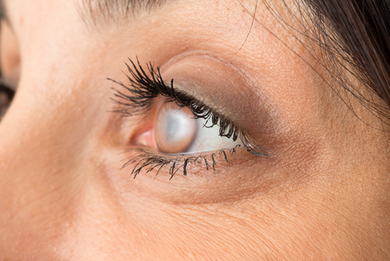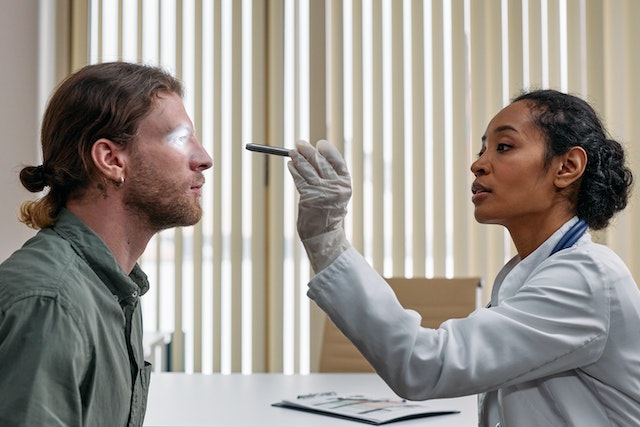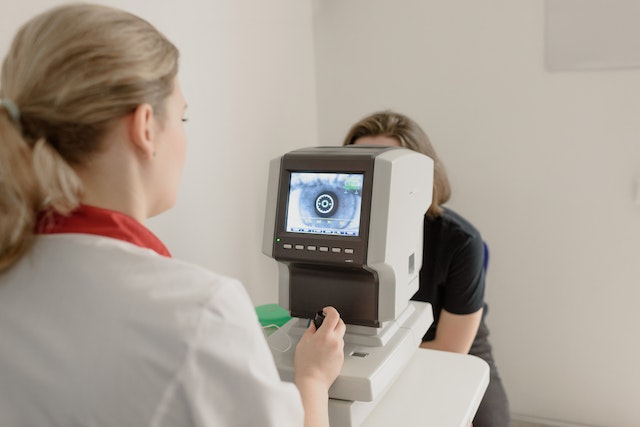What is an Eye Doctor Called?
You are probably wondering if you need an eye doctor, ophthalmologist or optometrist for your eye issues. In general the term, ophthalmology relates to the diagnose and treatment of eye-related conditions.
Eye doctors, or ophthalmologists, specialize in treating eyes and doing surgery. The educational and training requirements to become a physician or surgeon are around 12 years. Researchers in the field of ophthalmology examine vision disorders and eye diseases and discover ways to treat them.
An optometrist is trained to exam defects in vision, signs of injury, ocular diseases or abnormalities. Their services include prescribing eyeglasses and contacts, vision therapy, low vision aids, and eye care before and after surgery. They do not do surgeries, they only can refer a person to an ophthalmologist.
If you have any eye issues, you must consult an ophthalmologist, and an optometrist will refer you to the ophthalmologist in case of severe eye problems.
A Guide to Choosing the Best Eye Doctor
Dubai, a bustling global center known for its rich culture and top-tier healthcare, offers many options when it comes to healthcare providers. Among these options, the task of finding the best ophthalmologist in Dubai, whether you’re a newcomer to the city or a long-term resident, is a choice that influences your eye health and vision.
With its diverse and expanding population, Dubai features a thriving healthcare industry that encompasses a wide array of eye specialists. Both expats and local residents face a distinctive challenge: How can you effectively select the most suitable ophthalmologist in Dubai to cater to your individual needs and preferences?
Within this comprehensive guide, we will delve into the fundamental considerations and steps essential for making an educated decision when it comes to choosing an ophthalmologist in Dubai.
1: Consult your Insurance Plan
The first step is to find out which eye doctors your insurance plan covers, so you know that the surgery can be partially or fully covered. Choosing from a long list of choices is difficult, so you must narrow them down. At the North American Lasik & Eye Centre we accept Dubai government insurance programs, Enaya, Saada, Madhalla, Neuron, AXA, NGI, Next care, Dhaman, ADNIC, Oman. We also accept other insurances on reimbursement basis.
2: Getting Recommendations for Eye Doctor
Find out which eye doctors your family, friends, neighbors, and co-workers recommend. Someone will likely recommend a few eye doctors that accept your insurance plan since most clinics accept various insurance plans. So get on your Whatsapp or on social media and start asking in groups and among your friends which eye doctor is the best in Dubai.
3: Consult an Eye Doctor
After receiving a few recommendations, research to narrow down your choices. Be sure to verify the doctor’s credentials and inquire about their specializations, such as pediatrics, glaucoma, or LASIK.
The doctor you choose should be able to care for your eye health. You should be able to see their certifications on the wall and check if they have EIAC.
The North American Lasik and Eye Surgery Centre is accredited by the Emirates International Accreditation Centre (EIAC). This Accreditation assures you that this center is following the highest level of quality standards in health care.
We welcome you to visit our clinic and experience our friendly staff, doctors, and beautiful interior that is bright and cheery. Our doctors, staff, and technicians are committed to providing assistance while making our patients feel right at home.
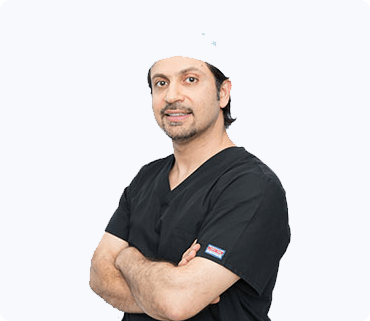
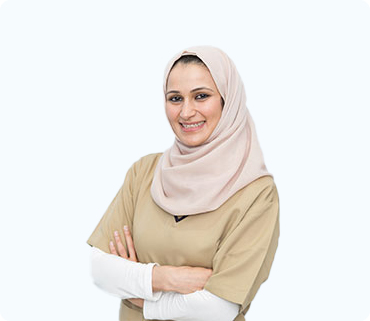
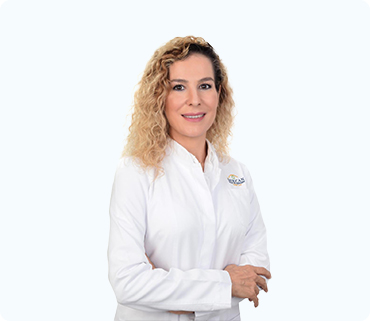
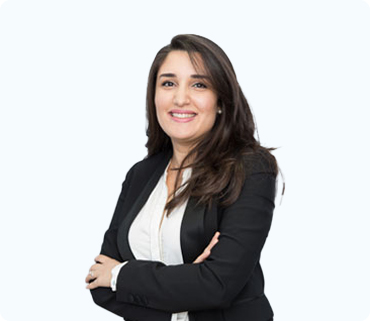
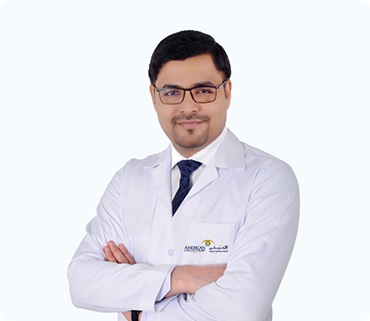



4: Visit Their Office
You should observe how they communicate with other patients who have had experiences at the clinic and check out their reviews. Our clinic has over 600 – 5 star reviews on our Facebook page and over 300 reviews on our Google Business Page.
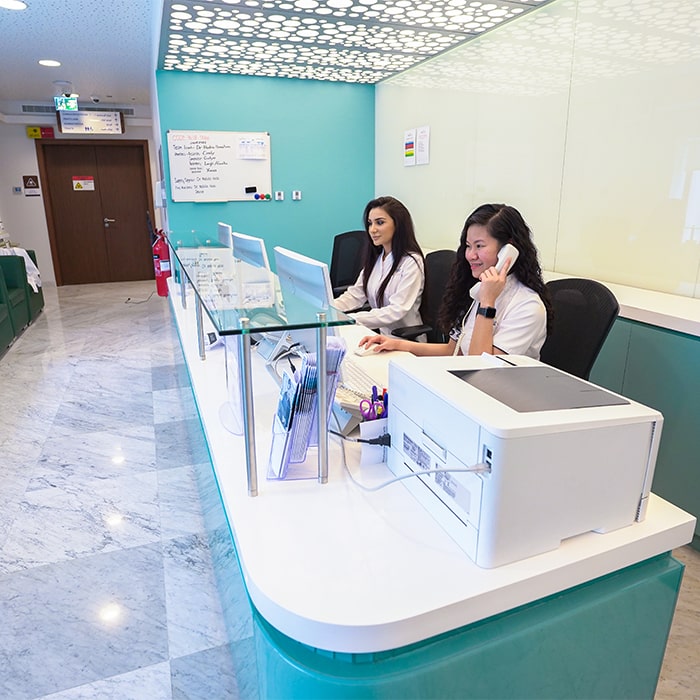
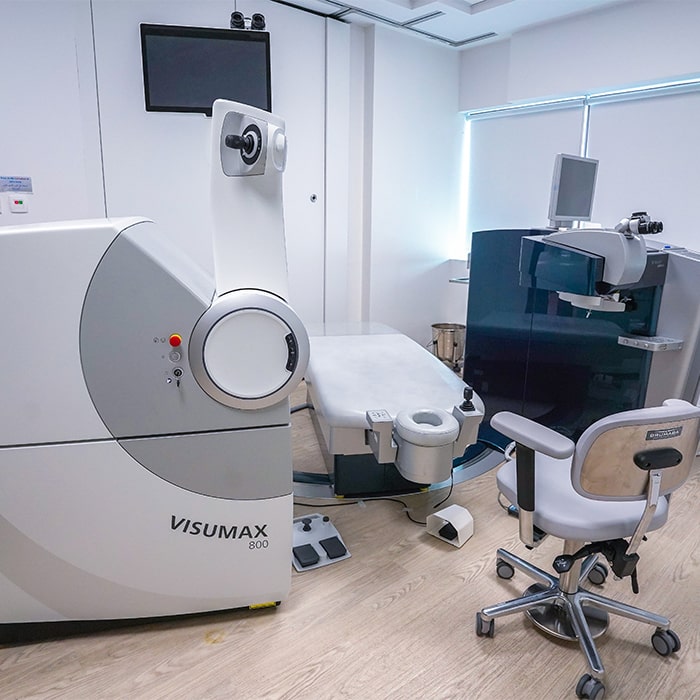

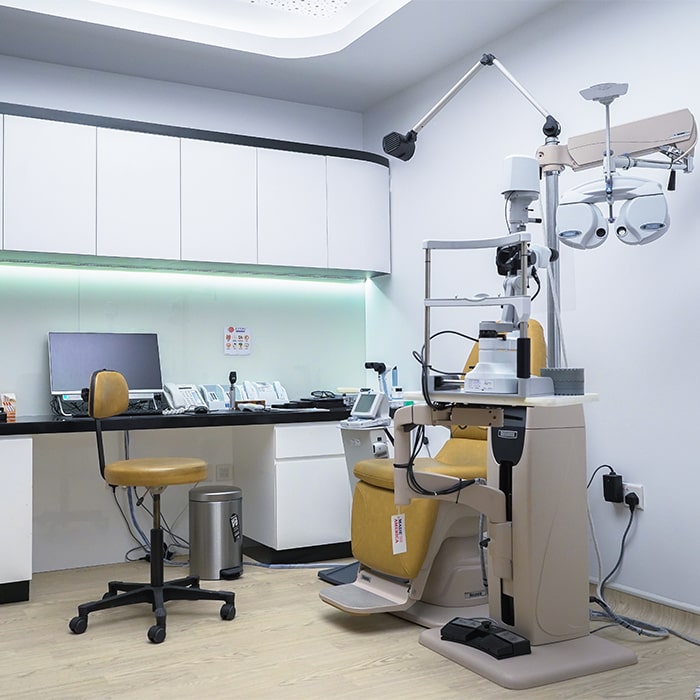
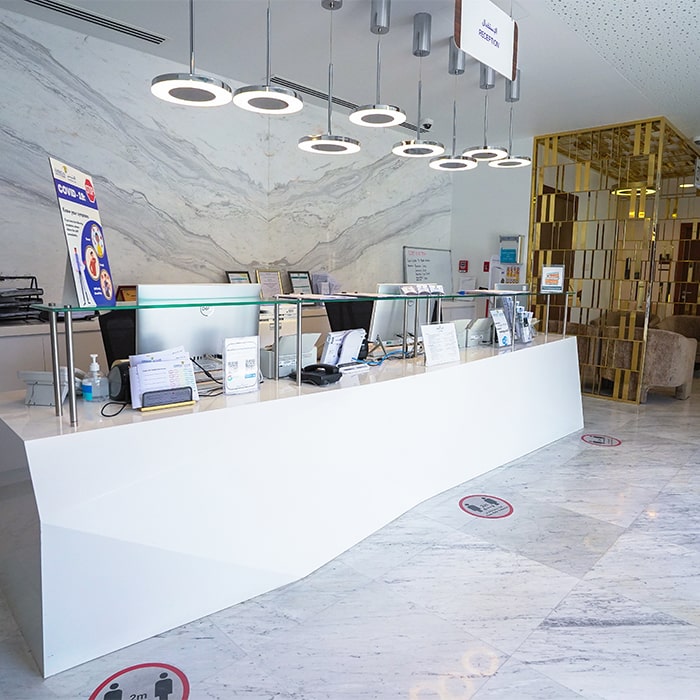
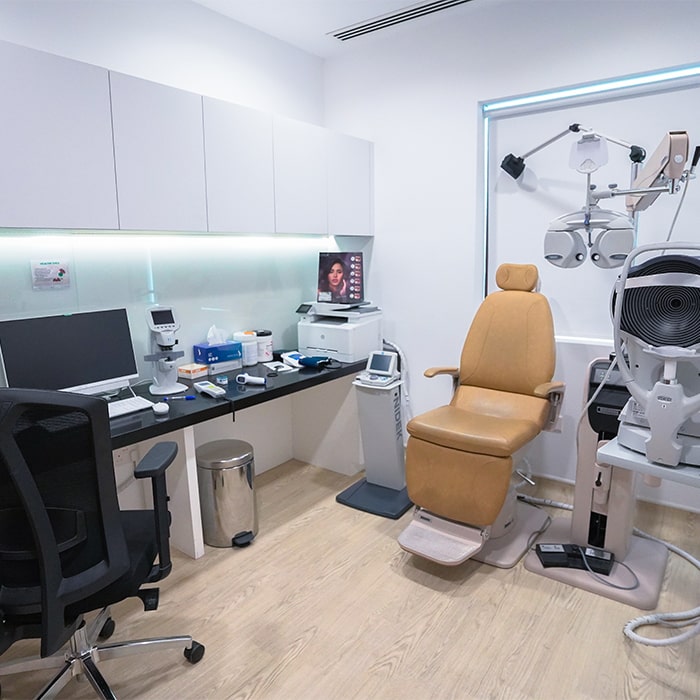
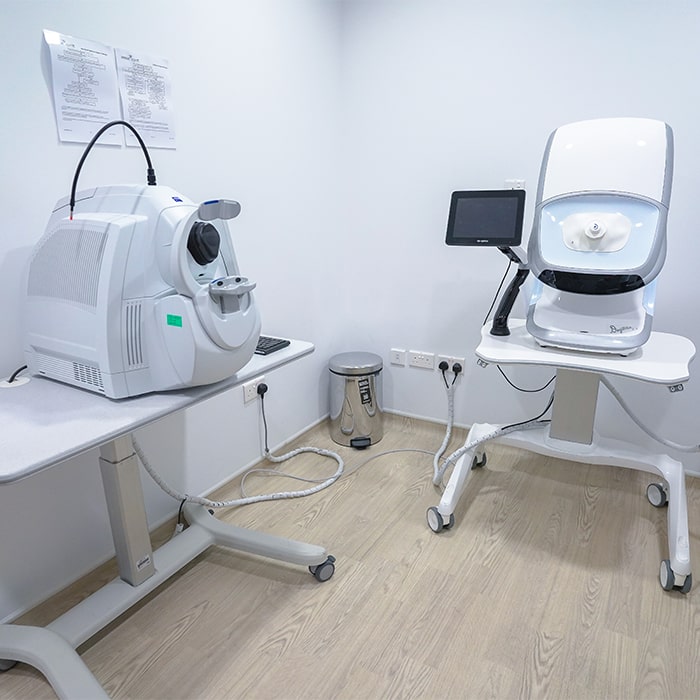
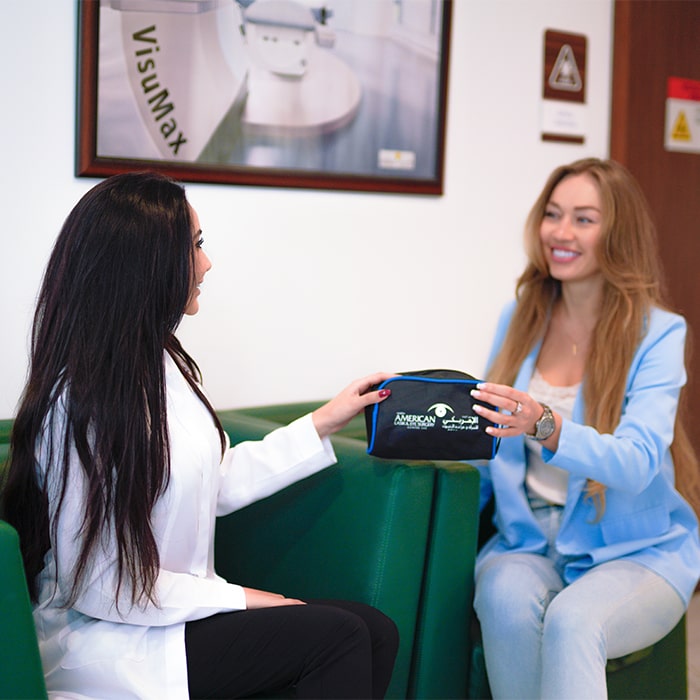
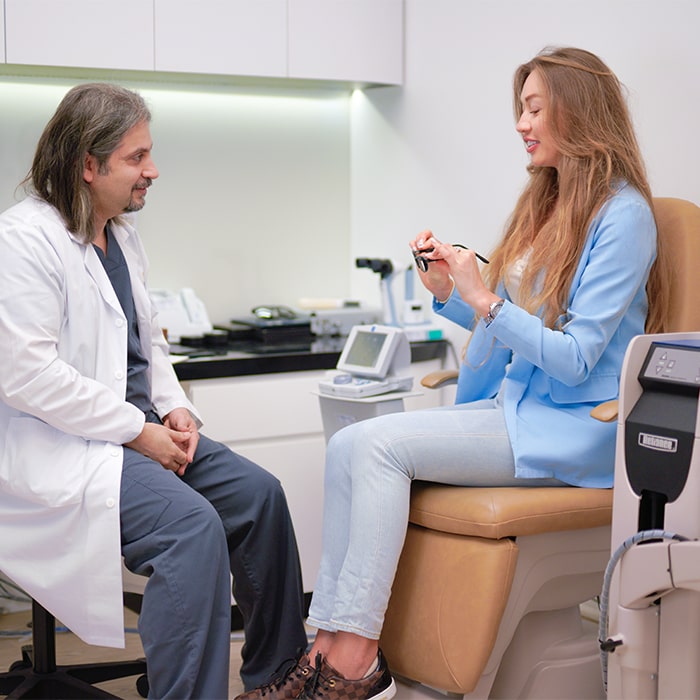
5: Talk with the Eye Doctor
When you meet with the eye doctor, take a list of questions. Be attentive to the doctor’s responses to your questions. Is the doctor making eye contact with you, or do you feel like they’re distracted? How quickly and briefly answer your questions?
In the doctor’s office, check to see if any diplomas or licenses are displayed. If there are any hanging on the walls, look at them. You should be able to find at least one of these types of things framed and hung up in your doctor’s office.
Here are some ideas for list of questions to ask your eye doctor:
- What tests will we be doing today?
- Do the tests include a dilated eye exam to check for diseases such as glaucoma and macular degeneration?
- Does my family history put me at risk for any eye diseases?
- How can I monitor my own eye health?
- How often should I come back for a comprehensive eye exam?
- Can I have a report of your findings to keep in my records?
- Are there lifestyle changes that might lower my risk?
What you Should Bring When Meeting an Eye Doctor?
- Health insurance information and a photo ID
- Eyeglasses or contact lenses you currently wear
- Information eye diseases in your family
- A list of your medications, allergies, and other conditions
- A notepad and pen, or digital device so you can take notes
When Should You Consult an Ophthalmologist in Dubai?
- Pain in the eyes that occurs suddenly and severely
- Discomfort around or in the eyes regularly
- Vision problems such as double vision, blurry vision, or hazy vision
- Light floaters or flashes
- A rainbow or halo appears around the lights
- “Spider webs” in the air
- One eye feels as if a “curtain” is falling across it
- There is a feeling of ink filling up one eye
- Unusual or painful sensitivity to light or glare
- Having red eyes or swollen eyelids
- Burning, itching, or discharge from the eyes
- Changes in your vision
In Dubai, our eye specialists are available for general check-ups. Our state-of-the-art facility and eye clinic ensure your comfort and satisfaction while attending to your needs. During your session, one of our ophthalmologists will diagnose your condition and recommend the best treatment for your eye care.
Experienced Ophthalmologists in Dubai
We have some of the best ophthalmologists in Dubai, and their expertise and knowledge in eye care make them recognized experts. As active members of academia, our ophthalmologists are committed to providing optimal care based on scientific evidence. The ophthalmologists at our practice have a successful track record in treating eye diseases.
High-quality medical equipment:
Modern medical equipment is used in our clinic. Our eye clinics and equipment are regularly maintained and updated with the latest technological advances to provide our patients with the best ophthalmology-related treatment!
We are one of the top ophthalmology departments in Dubai, with ophthalmologists and support staff devoted to our patients. Through the expertise of our team of professionals, we make sure to exceed your expectations in terms of medical expertise.








Various Ophthalmology Procedures
The eye doctors at the North American Lasik & Eye Centre in Dubai offers the following services:
Lasik Eye Surgery Options
ReLEx SMILE
ReLEx® SMILE represents a groundbreaking approach to laser eye surgery, specifically designed to address pronounced cases of nearsightedness. SMILE, an acronym for Small Incision Lenticule Extraction, characterizes a bladeless, minimally invasive surgical technique. SMILE eye surgery offers a viable option for individuals, whether they have astigmatism or not, making it a compelling alternative to the more widely recognized LASIK and LASEK procedures.
Femto Lasik
Femto LASIK boasts quicker healing times and a reduced risk of complications compared to conventional LASIK, owing to its utilization of laser technology instead of a mechanical cutting instrument to create a small corneal flap. The ultimate objective is to employ laser technology for corneal reshaping, addressing vision issues such as nearsightedness and farsightedness.
Ultra LASIK
Utilizing the custom Wavefront device, Ultra LASIK can craft an exceptionally thin corneal flap, departing from the conventional microkeratome method known for its associated complications. This advanced technique employs high-speed pulses, facilitating precise identification and formation of the optimal flap position. Consequently, when the Excimer laser extends beyond the flap, it can seamlessly sculpt the cornea into an ideal curvature, swiftly rectifying the refractive error, all while prioritizing safety.
Cataract Surgery
A cataract is a prevalent eye condition marked by the opacification of the eye’s normally clear natural lens. This opacity gradually diminishes the quality of one’s vision. Cataracts can develop in either one or both eyes and are predominantly associated with the aging process, although they can also result from injuries, medical conditions, or genetic factors. Surgical intervention is the primary method for addressing cataracts. In this procedure, your ophthalmologist will extract the clouded lens from your eye and substitute it with an artificial lens known as an intraocular lens (IOL). Typically lasting around 1 hour, the surgery is virtually painless. It is common for patients to remain awake during cataract surgery.
Keratoconus Treatment
Keratoconus is an advancing eye disorder characterized by the gradual thinning and reshaping of the cornea, the transparent front surface of the eye, resulting in distorted vision. The available treatment choices for keratoconus are contingent upon the degree of severity exhibited by the condition. The options for keratoconus treatment at our clinic include:
- Corneal Crosslinking (CXL)
- Intercorneal Ring Segments (ICRS)
- Phakic IOLs
- Corneal Transplant
Glaucoma Treatment
Glaucoma comprises a spectrum of eye disorders that can potentially harm the optic nerve, frequently as a result of elevated intraocular pressure, which pertains to the fluid pressure within the eye. The primary objective of treating glaucoma is to diminish intraocular pressure and impede or decelerate the advancement of the condition.
A range of treatment possibilities exists for glaucoma, with the selection contingent upon the type and seriousness of the ailment, in addition to the individual’s general health. Here are the principal alternatives:
- Trabeculectomy involves the creation of a fresh drainage pathway within the eye, enabling the removal of surplus fluid and thereby reducing intraocular pressure.
- Drainage implants, also known as glaucoma drainage devices, are tiny devices surgically implanted in the eye with the purpose of facilitating fluid drainage and decreasing pressure.
- Minimally Invasive Glaucoma Surgery (MIGS) encompasses modern approaches aimed at enhancing drainage through less invasive methods, frequently in combination with cataract surgery.

